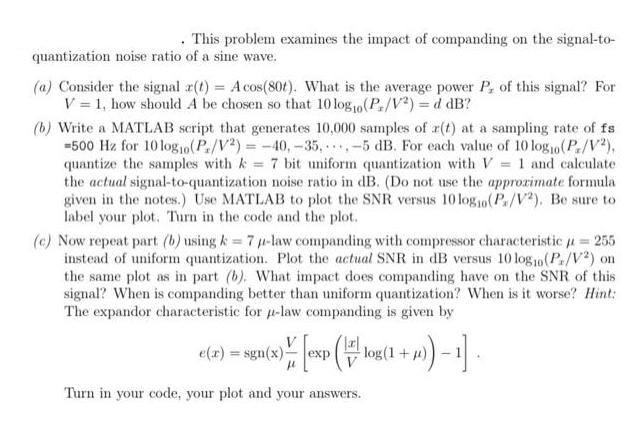Answered step by step
Verified Expert Solution
Question
1 Approved Answer
. This problem examines the impact of companding on the signal-to- quantization noise ratio of a sine wave. (a) Consider the signal r(t) =

. This problem examines the impact of companding on the signal-to- quantization noise ratio of a sine wave. (a) Consider the signal r(t) = A cos(80t). What is the average power P, of this signal? For V = 1, how should A be chosen so that 10 logo (P/V) = d dB? (b) Write a MATLAB script that generates 10,000 samples of r(t) at a sampling rate of fs -500 Hz for 10 log10(P/V2)=-40, -35,-5 dB. For each value of 10 log10 (Pr/V2), quantize the samples with k = 7 bit uniform quantization with V= 1 and calculate the actual signal-to-quantization noise ratio in dB. (Do not use the approximate formula given in the notes.) Use MATLAB to plot the SNR versus 10 logio(Pr/V2). Be sure to label your plot. Turn in the code and the plot. (c) Now repeat part (b) using k = 7 p-law companding with compressor characteristic = 255 instead of uniform quantization. Plot the actual SNR in dB versus 10 log0 (Pr/V) on the same plot as in part (b). What impact does companding have on the SNR of this signal? When is companding better than uniform quantization? When is it worse? Hint: The expandor characteristic for p-law companding is given by e(a) = sgn(x) [exp (log(1 + )) - Turn in your code, your plot and your answers.
Step by Step Solution
There are 3 Steps involved in it
Step: 1
Heres a stepbystep approach to solving the problem a Average power of the signal To calculate the average power of the signal xt we need to find the square of the signal and take its average over a pe...
Get Instant Access to Expert-Tailored Solutions
See step-by-step solutions with expert insights and AI powered tools for academic success
Step: 2

Step: 3

Ace Your Homework with AI
Get the answers you need in no time with our AI-driven, step-by-step assistance
Get Started


